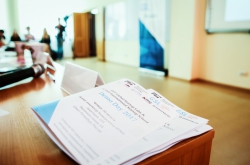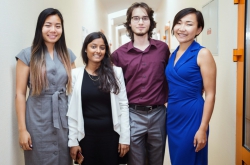First Step
The five-member team’s project aims to facilitate communications between nightclubs and their clients. The application would allow people to meet each other through the online service and to treat each other with drinks. The project is beneficial to clubs, too, as it would increase their sales. To start the interaction, users can send requests to each other through the app – ranging from simple “winks” to sending them drinks. The recipient gets the request and decides whether to accept it and, if so, which drink they would like. They may even send one in return. Each user can even compile a list of their favored cocktails and beverages. If a request is accepted, the cost of drinks is automatically deducted from the sender’s card, after which they are free to pick their order from the counter and take it to their newfound companion. The app only displays the users who are located in the same location at present time. The team has already created an interactive prototype and sent it in for development.

First Step development team
Team members: Angelina Ivanova, Anastasia Olovetskaya, Artyom Rychkov, Vladislav Gevorgyan, Vladimir Slivtsov.
Mydeas
The team, made up of two graduates of ITMO’s Department of Computational Technologies, wants to help vloggers in search of funding by matching them with the right sponsors who could fund their work in return for advertising. To find an investor, users sign up for the services and publish a description of their planned project. In turn, the system finds investors who fit the blogger’s needs and brings them together.
“This isn’t the first acceleration program we’ve taken part in. We also work with Future Technolgies and, I think, both these programs have a complementary effect on us. Here, at Global Startup Labs, we learn about methodology, and this methodology lets us find feedback: by staying aware, we can figure out what works and what doesn’t. At Future Technologies we meet great speakers and have our practice by testing out our various hypotheses,” – explains Vladislav Ekimov, one of the developers.

Mydeas development team
Team members: Vladislav Ekimov, Rodion Negov.
Nuts and Seeds
This project’s team has developed a chat bot that, in gamified format, lets people test how popular their idea might be to an audience. The bot works with Telegram, but the developers plan to upscale their projects by adapting it to other popular messenger apps. Many of today’s startups often can’t find an answer to the most basic questions: who would be interested in my product? Who has done this before me? Are people ready to pay for it?
Now, if a user has a startup or even just a concept, they have a way to get feedback on it, explain the developers. This service is also useful to those who are interested in startup development by itself and to corporate clients – companies who conduct massive marketing research before releasing their product. Marketing research can be qualitative and quantitative. The project offers them an additional tool for collection of quantitative information. A third type of clients – companies, will serve as source of revenue for the project.
How it works: a user (or a company) can send their idea to the chat bot and gain feedback such as: what amount of “likes” it would get, how many views, etc. If a client wants to see more detailed stats, they can use the service to find out which age groups like their idea most, what other interests they have and the like.
“MIT is one of the top six universities in the world; the MBAs who are running this project have a great deal of experience in conducting such programs – and they themselves work in startups, too. Sure, you can learn the basics from a book, but you won’t get to work with people who have been through this experience and who can give you tips on how to handle each stage of development, how to improve; what to pay attention to and what to ignore. Our coaches provide us with a completely different approach to startup development and their experience helps us a lot,” – says team member Bogdan Shelygin.

Nuts and Seeds development team
Team members: Bogdan Shelygin, German Duk and others.
Sourcement
This startup’s basic idea is to bring together open source software maintainers (those who provide support for open source projects) and beginner and mid-level programmers to provide inexperienced specialists the opportunity to learn programming for real projects. According to the team’s members, the educational services that are available today (Codeacademy, etc.) do not provide their students with real-life practice. Instead, they create a limited artificial environment; an illusion of moving forward in one’s understanding of the programming work process.
“Our target audience is those who are already working as programmers, but have reached the point where they need to create their own project and simply lack the experience they would need to do that. Users can sign up on the website, find an open source project that suits their interests and their learning path. Then they get in touch with the project’s maintainer and complete a number of prepared interactive lessons. During that process they continue their communication with the maintainer. Users have to pay a certain amount for the advanced level. Most of the sum is relayed to the maintainer; that is our monetization strategy. In addition, the maintainer gains trained specialists at the end of this process,” – explains team member Ilya Sapranidi.

Sourcement development team
Team members: Ilya Sapranidi, Mark Selyaev, Yegor Zyrianov, Andrey Turov.
Speakability
This is a linguistic project aimed at honing users’ conversational skills in English through real-life situations. Users can do that in quest format: the application lets them take part in real-life encounters together with a personal mentor. This format of “natural conversation” can help them break the language barrier. The application would be most useful to those who, while familiar with the fine points of grammar, cannot maintain actual conversation in a foreign language. The service helps develop and improve upon the basic language skills required for everyday use. Developers claim that this system is much more effective than language schools where students are usually taught the academic dogmas that can’t be properly applied in real life or through use of phrasebooks, which are just as inefficient learning tools.
The application often makes use of a microphone. Developers emphasize that gamification and voice control are the perfect elements for a service that develops speaking skills. Today people who want to learn a language have two options – to join a group or to take a trip abroad. But both of these options are quite expensive. And even in conversation clubs, some students simply can’t join the learning process due to psychological barriers. The team offers users a cheaper and faster way to learn how to talk in English. The application features several levels of difficulty.

Speakability development team
Team members: Anastasia Mirgian, Anastasia Zorenko, Akmaral Abilmajit, Evgeniy Krotkov, Vladislav Voitov.
The Assistant
This application should help restaurants in St. Petersburg better maintain an online presence. The app would be integrated with several online platforms, such as TripAdvisor, Foursquare, Instagram, VK and others. It is presented as a service which provides restaurant owners a way to keep track of customer feedback and provide timely responses, as well as updating the establishment’s information on several online platforms simultaneously.
“Each restaurant has a profile page with various tabs. For example, the owner may click on “Feedback” and receive a readout of all the recent reviews left on various websites and services and even reply to them. Another intention is to maximize the number of negative reviews: if a user is pleased with the restaurant they visited, they can share their experience with other potential clients – yet, if they were not pleased, they can communicate that internally to the owner. A major issue for many establishments is that most reviews are simply left unseen. Our platform should optimize the customer-owner interaction process,” – shares developer Anastasia Koroleva.

The Assistant development team
Team members: Maria Tumareva, Anastasia Koroleva, Kirill Moiseev.
The program’s mentor, Big Data expert Artyom Malkov, some of the teams can already start thinking about expanding their scope beyond the St. Petersburg market.

Artyom Malkov
“I came here today to talk about using data and scientific approach to build startups. The thing is that first you need to evaluate the users’ needs – meaning that before you start spending your money on development, you need to talk to 20-50 clients, gather some stats and figure out what they want and how much they’re ready to pay for it. Then, after the product is finished, it’s important to measure its parameters (which features are used, how much it costs to advertise, where clients “fall off”). Today’s entrepreneurship isn’t just about having an idea. It’s about working with data in a major way, and this is exactly what I share with others here and what I use in my own work. Of the four teams I’ve spoken to so far, I can work on a common project with at least two. Many of these projects are aimed at the target audience in St. Petersburg, but I think many of them deserve a wider application on a larger scale,” – says Mr. Malkov.





